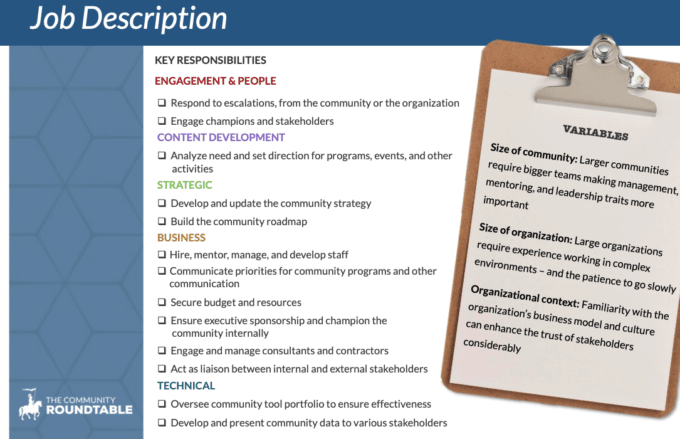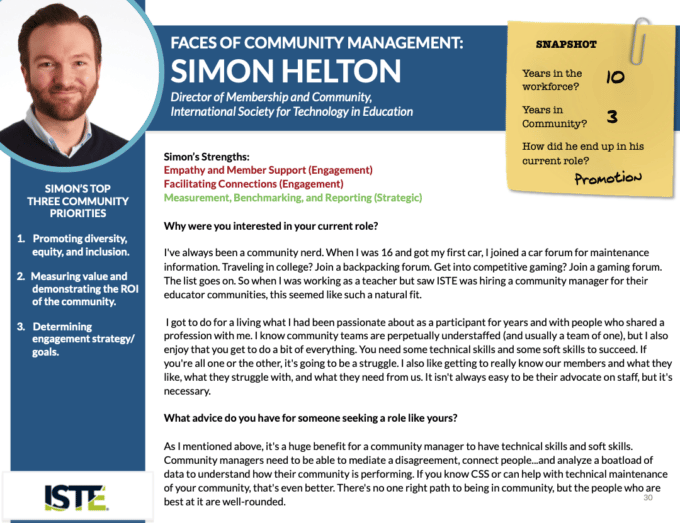Directors of Community lead community programs and typically lead teams that include community specialists, managers, and strategists. They often have operational backgrounds and are paired with community experts with their focus on securing internal support, integrating across the organization, managing a team, and communicating strategic progress.
Directors of Community focus on the health of a community program. They are responsible for operations – planning and delivering on the community roadmap. Their priorities tend to be governance, internal advocacy, training, and measurement.
A large part of the Director of Community role is as an internal champion – ensuring that executives and other stakeholders understand the value of the community, are getting the information they need, and that the community is aligned with their priorities. While directors still participate occasionally in tactical responsibilities and a community background is valuable, their main focus is on operational strategy.
Director of Community Key Responsibilities
ENGAGEMENT & PEOPLE
- Respond to escalations, from the community or the organization
- Engage champions and stakeholders
CONTENT DEVELOPMENT
- Analyze the need and set direction for programs, events, and other activities
STRATEGIC
- Develop and update the community strategy
- Build the community roadmap
BUSINESS
- Hire, mentor, manage, and develop staff
- Communicate priorities for community programs and other communication
- Secure budget and resources
- Ensure executive sponsorship and champion the community internally
- Engage and manage consultants and contractors
- Act as liaison between internal and external stakeholders
TECHNICAL
- Oversee community tool portfolio to ensure effectiveness
- Develop and present community data to various stakeholders

These skills are a small example of the responsibilities and requirements of a successful director of community. As always, we encourage you to think about the unique requirements of your roles and use our Community Skills Framework™ as inspiration for creating the right director of community job description for your organization.
Variables to consider when drafting your community manager job description include:
- Size of community: Larger communities require bigger teams making management, mentoring, and leadership traits more important
- Size of organization: Large organizations require experience working in complex environments – and the patience to go slowly
- Organizational context: Familiarity with the organization’s business model and culture can enhance the trust of stakeholders considerably
Profile of a Real Director of Community
SIMON HELTON Director of Membership and Community, International Society for Technology in Education

Simon’s Top Three Community Challenges
- Promoting diversity, equity, and inclusion.
- Measuringvalueand demonstrating the ROI of the community.
- Determining engagement strategy/ goals.
Simon’s Strengths:
- Empathy and Member Support (Engagement)
- Facilitating Connections (Engagement)
- Measurement, Benchmarking, and Reporting (Strategic)
Why were you interested in your current role?
I’ve always been a community nerd. When I was 16 and got my first car, I joined a car forum for maintenance information. Traveling in college? Join a backpacking forum. Get into competitive gaming? Join a gaming forum. The list goes on. So when I was working as a teacher but saw ISTE was hiring a community manager for their educator communities, this seemed like such a natural fit.
I got to do for a living what I had been passionate about as a participant for years and with people who shared a profession with me. I know community teams are perpetually understaffed (and usually a team of one), but I also enjoy that you get to do a bit of everything. You need some technical skills and some soft skills to succeed. If you’re all one or the other, it’s going to be a struggle. I also like getting to really know our members and what they like, what they struggle with, and what they need from us. It isn’t always easy to be their advocate on staff, but it’s necessary.
What advice do you have for someone seeking a role like yours?
As I mentioned above, it’s a huge benefit for a community manager to have technical skills and soft skills. Community managers need to be able to mediate a disagreement, connect people…and analyze a boatload of data to understand how their community is performing. If you know CSS or can help with technical maintenance of your community, that’s even better. There’s no one right path to being in community, but the people who are best at it are well-rounded.
